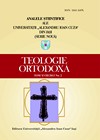Negation and Silence in Proclus
Negation and Silence in Proclus
Author(s): Daniel JugrinSubject(s): Christian Theology and Religion
Published by: Editura Universităţii »Alexandru Ioan Cuza« din Iaşi
Keywords: Proclus; negation; affirmation; transcendence; negative theology
Summary/Abstract: In his Commentary of Plato’s Parmenides, Proclus analyses the state of the negations which express transcendence. The inferior negation refers to the being which is superior to non-being (as defect), the coordinated negation refers to the being which has the same rank as non-being and, finally, the type of negation superior to assertion expresses the type of Non-Being which is above being. Only if negation is under the influence of the Not-being superior to being, is it superior to affirmation. In the situation of the not-being which is on the same rank with the being, both negations and affirmations can be adequately applied to being. In the case of Non-being which is above being, neither the affirmations, nor the negations, properly apply. The negations of the One retain, on one hand, the meaning of the transcendence of the One with regard to all things, and, on the other hand, they give back to the One its role as the cause of all things – which were, in the first instance, negated of the One. Proclus establishes a relation of precise correspondence between the negations of the First Hypothesis and the affirmations of the Second Hypothesis, revealing that all those positive assertions proceed from these negations, and the cause of these is the One, as being prior to all other things. The negations do not embody a “lack” or a “privation” of the absolute One, but they actually hide the transcendence of the cause in regard to everything it generates.
Journal: Analele Ştiinţifice ale Universităţii »Alexandru Ioan Cuza« din Iaşi. Teologie Ortodoxă
- Issue Year: 2013
- Issue No: 2
- Page Range: 127-144
- Page Count: 18
- Language: English

